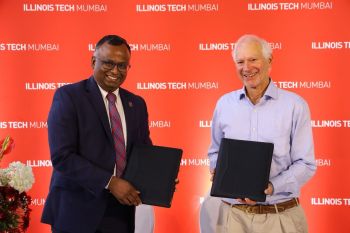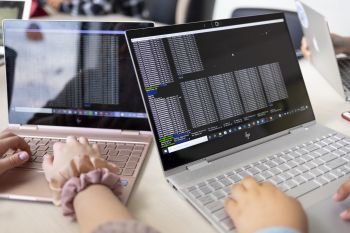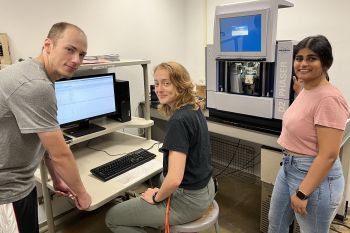Automated Window Shades Show Potential for Significant Energy Savings, Illinois Tech Study Finds
Research done at Willis Tower in Chicago shows that automated insulating window shades can significantly reduce energy consumption, with strong positive response from office users

CHICAGO—May 17, 2023—Automated insulating window shades can cut energy consumption by approximately one-quarter and may recoup the cost of installation within three to five years, according to a landmark study conducted by Illinois Institute of Technology researchers at Willis Tower. The study, funded by ComEd, showcases a promising path for sustainability and energy efficiency in architectural design.
Temperature regulation typically accounts for 30–40 percent of the energy used by buildings in climates similar to Chicago. The research team, led by Assistant Professor of Architectural Engineering Mohammad Heidarinejad, focused on the role of window shades, which are often overlooked in energy-savings solutions. The findings underscore how insulating window shades, when connected to an automated control system, can dramatically reduce energy consumption in both heating and cooling seasons.
Heidarinejad says addressing energy waste in standing buildings is a major problem.
“If you’re designing a new building, you have a lot of freedom to look at new technologies that save on energy consumption, but for existing buildings, you have limited options,” says Heidarinejad.
The study was conducted over a ten-month period in collaboration with Parata Solutions LLC and Amatis Controls at the Equity Office at Willis Tower, a building with single-paned windows and a high window-to-wall ratio. Three control strategies for Parata’s patented insulating shades were tested: fully manual control, a predefined schedule, and a sensor-based system considering factors such as outdoor conditions and room occupancy.
The findings were impressive, indicating a 25 percent decrease in energy use during both heating and cooling seasons with the use of the motorized shades. Even more significant was the positive response from office users, with 80 percent expressing preference for the new shades over the old blinds.
Christopher Nurre, CEO of Parata Solutions LLC, praised the collaboration with Illinois Tech.
“Working with Mohammad Heidarinejad and his team at Illinois Institute of Technology was a game changer for our company,” says Nurre. “Their rigorous field measurements helped confirm the efficacy of our shade system to drastically reduce energy use while offering a solution that occupants and building owners prefer over the incumbent.”
The study not only contributed to sustainable architectural solutions but also served as a real-world learning experience for Illinois Tech students involved in the project. Heidarinejad noted the importance of students learning to collaborate on real projects.
“We had students doing instrumentation, data collection, and modeling, and their results were implemented in the actual build study,” says Heidarinejad. “It was important for students to learn how to collaborate on a real project.”
Further research is planned to explore the effectiveness of these innovative window shades under different conditions, such as in buildings that use natural gas, in different climates, or with windows facing different directions.
Brent Stephens, a co-principal investigator on the project and the Arthur W. Hill Endowed Chair in Sustainability, highlighted how this innovative, immediately applicable research aligns perfectly with Illinois Tech’s mission.
“In addition to the exciting findings of energy savings and payback period, this project served as a perfect example of the type of industry-relevant research we enjoy—combining field measurements and computer simulations to evaluate a unique strategy to save energy in one of the most famous buildings in the world,” Stephens says.
Disclaimer: “Research reported in this publication was supported by the Commonwealth Edison Company. This content is solely the responsibility of the authors and does not necessarily represent the official views of the Commonwealth Edison Company.”
Mohammad Heidarinejad, “Commercial Interior Insulated Shades,” Commonwealth Edison Company
Image: Infrared image showing the temperature of the window with (left) and without (right) insulating shades.
Illinois Institute of Technology
Based in the global metropolis of Chicago, Illinois Tech was born to liberate the collective power of difference to advance technology and progress for all. It is the only tech-focused university in the city, and it stands at the crossroads of exploration and invention, advancing the future of Chicago and the world. It offers undergraduate and graduate degrees in engineering, computing, architecture, business, design, science and human sciences, and law. Illinois Tech students are guaranteed hands-on experiences, personalized mentorship, and job readiness through the university's one-of-a-kind Elevate program. Its graduates lead the state and much of the nation in economic prosperity. Its faculty and alumni built the Chicago skyline. And every day in the living lab of the city, Illinois Tech fuels breakthroughs that change lives. Visit iit.edu.
Armour College of Engineering
Armour College of Engineering has been educating world-class engineers since the university’s founding in 1890. As future engineers who will innovate in the twenty-first century, Armour students learn the principles of the profession and work in an interdisciplinary environment that emphasizes hands-on learning, teamwork, and leadership, all through the lens of our four engineering themes—water, health, energy, and security—that highlight issues vital today and in the future. Armour is home to five departments and nine ABET-accredited undergraduate majors, which provide a wide breadth of exciting programs from which to choose. Illinois Tech alumni have advanced to careers as presidents of companies and professors at major universities—and have become members of the National Academy of Engineering, the highest distinction in the field.
Media contacts
Kevin Dollear
Communications Manager
Illinois Institute of Technology
Cell: 773-860-5712
kdollear@illinoistech.edu




